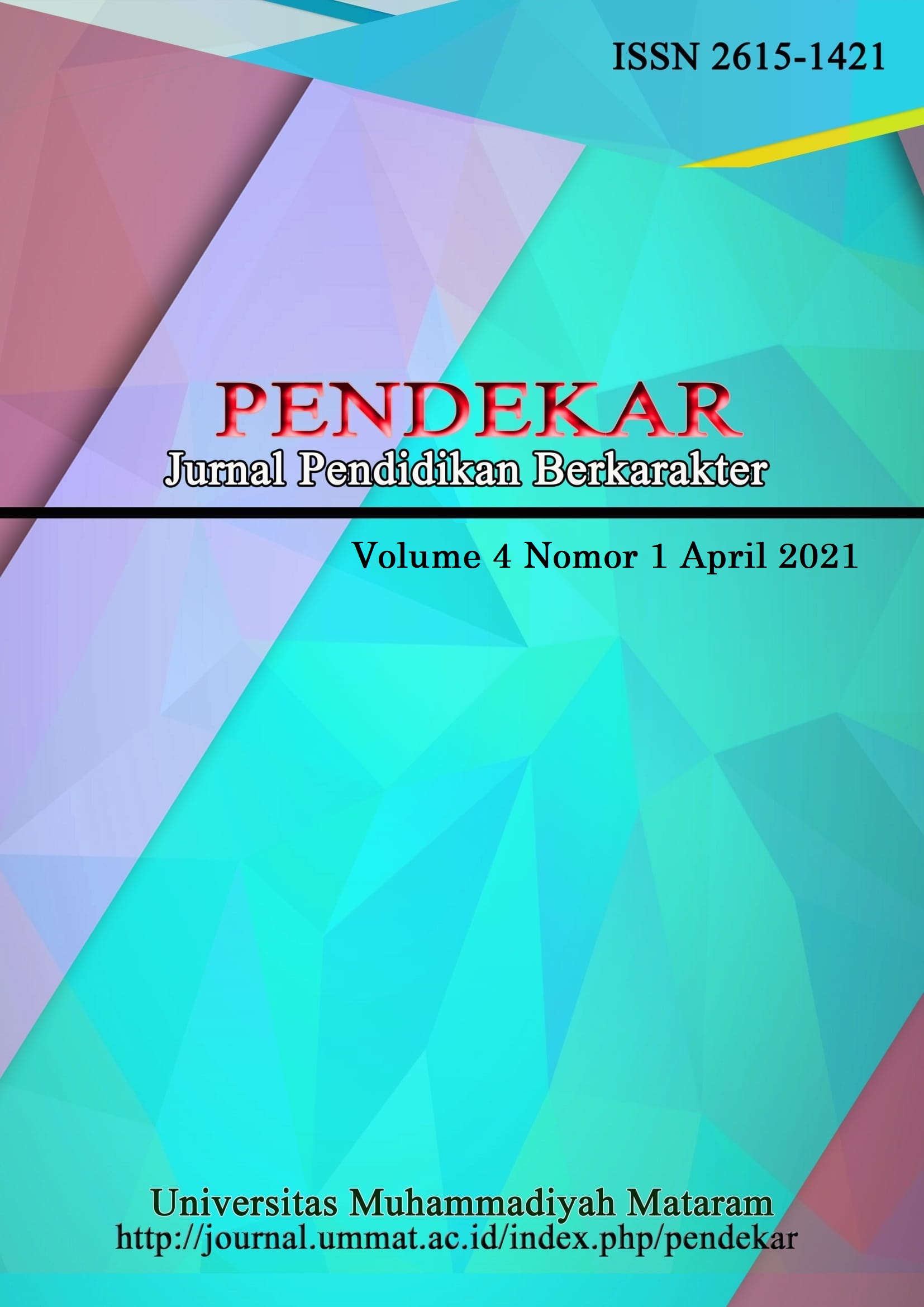SHAPING YOUNG LEARNERS’ CHARACTER THROUGH TEACHER QUESTIONING IN ENGLISH CLASSROOM ACTIVITIES
DOI:
https://doi.org/10.31764/pendekar.v4i1.4416Keywords:
Character Building, Young Learners, Teacher Questioning, English Classroom, Activities.Abstract
Abstrak: Artikel ini memberikan gagasan tentang pentingnya pembentukan karakter bagi siswa, terutama bagi pelajar muda. Orang menyadari bahwa pembentukan karakter baik seseorang dimulai sejak usia dini. Banyak cara yang harus dilakukan untuk membentuk karakter khususnya bagi anak didik, salah satunya melalui tanya jawab guru dalam kegiatan kelas bahasa Inggris. Kegiatan tersebut dapat diterapkan pada siswa sekolah dasar, dan hasilnya diharapkan karakter siswa menjadi lebih baik dengan menunjukkan kemampuannya dalam menjawab pertanyaan dengan lebih sopan, bertanya kepada guru secara bergiliran, dan menghargai pendapat orang lain.
Abstract:  This article provides ideas on the importance of character building for students, especially for the young learners. People realize that shaping good character of somebody is started at the early stage of the age. Many ways shall be done to shape character especially for young learners, one of them is through teacher questioning in English classroom activities. The activities can be applied to the elementary school students, and the result is expected the students’ characters become better by showing their ability in answering questions more polite, asking the teachers in turns, and respect opinions of other people.
References
Adedoyin, O. (2010). An Investigation of The Effects of Teachers’classroom Questions on The Achievements of Students In Mathematics: Case Study of Botswana Community Junior Secondary Schools. European Journal of Educational Studies, 2(3).
Adnan, N. (2014). Character Building through Traditional Dance as Developing Identity Belongings: A Study of Indonesia-Malaysia. International Conference on Languages and Arts, 340–346.
Albertus, D. K. (2011). Pendidikan karakter: strategi mendidik anak di zaman global. Jakarta: Grasindo.
Brualdi Timmins, A. C. (2011). Classroom questions. Practical Assessment, Research, and Evaluation, 6(1), 6.
Cameron, L. (2001). Children learning a foreign language. Lynne Cameron, Teaching Languages to Young Learners, 1–20.
David, O. F. (2007). Teacher’s Questioning Behaviour and. Humanity & Social Sciences Journal, 2(2), 127–131.
Eshach, H., Dor-Ziderman, Y., & Yefroimsky, Y. (2014). Question asking in the science classroom: Teacher attitudes and practices. Journal of Science Education and Technology, 23(1), 67–81.
Hasanah, I., & Syafri, H. (2014). Getting Re-Charge The Students’characters In English Days Program (EDP). International Conference on Languages and Arts, 257–260.
Huitt, W. (2004). Moral and character development. Educational Psychology Interactive, 110.
Kalendova, E. (2008). The use of game-like activities in teaching English to young children. Masaryk University.
Lickona, T. (2009). Educating for character: How our schools can teach respect and responsibility. Bantam.
Rahmi, M. M., & Erlinda, R. (2014). Teachers’role In Building Students’character Through English Language Teaching Classroom. International Conference on Languages and Arts, 320–327.
Shomoossi, N. (1997). The Effect of Teacher’s Questioning Behavior on EFL Classroom Interaction: A Classroom-Based Research. Online Submission.
Suryadi, B. (2017). Pendidikan karakter: solusi mengatasi krisis moral bangsa. Nizham Journal of Islamic Studies, 3(2), 71–84.
楊志芳. (2010). A Discourse Analysis of a Native and a Non-native English Teacher’s Questioning in Elementary EFL Classrooms: A Case Study. Educational Linguistics Forum v. 1 Pp. 93-125, 2010.01.
Downloads
Published
Issue
Section
License
Authors who publish articles in International Journal on Student Research in Education, Science, and Technology agree to the following terms:
- Authors retain copyright of the article and grant the journal right of first publication with the work simultaneously licensed under a CC-BY-SA or The Creative Commons Attribution–ShareAlike License.
- Authors are able to enter into separate, additional contractual arrangements for the non-exclusive distribution of the journal's published version of the work (e.g., post it to an institutional repository or publish it in a book), with an acknowledgment of its initial publication in this journal.
- Authors are permitted and encouraged to post their work online (e.g., in institutional repositories or on their website) prior to and during the submission process, as it can lead to productive exchanges, as well as earlier and greater citation of published work (See The Effect of Open Access).

